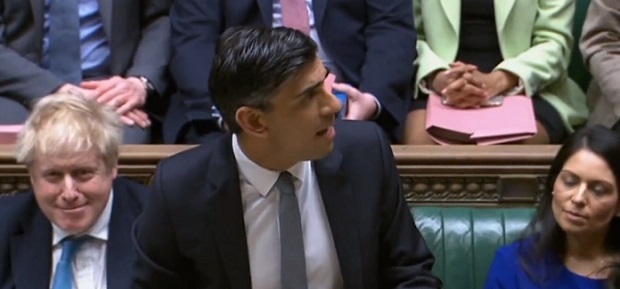UK's Sunak hints at energy bill help after mini-budget criticism

UK Finance Minister Rishi Sunak’s mini-budget was under fire on Thursday for failing to tackle the cost of living crisis hitting the lowest paid and vulnerable.
A defensive Sunak suggested there could be more help for surging energy bills later this year, but insisted his poorly-received Spring statement would still help Britons struggling to make ends meet in the face of rampant inflation.
He said inflation and geopolitical volatility were hurting all economies.
“We’re not alone in experiencing them, and I can’t, I wish I could – and it’s the hardest part about this job not being able to do everything that people would like you to do – but I can’t make every problem go away, but where we can make a difference we want to, and that’s what yesterday was about,” he told the BBC on Thursday.
POVERTY FEARS FOR MILLIONS
The measures unveiled by Sunak have come in for stern criticism from economists, who feel he has not gone far enough to protect incomes from inflation, which hit a 30-year high of 6.2% yesterday.
The Resolution Foundation, which focuses on the lower income bracket of workers, said 1.3 million people – including 500,000 children – would be pushed into absolute poverty in 2022/23 - the first time Britain has seen such an increase outside of a recession.
Typical working-age household incomes are set to fall by 4% in real-terms in 2022-23, a loss of £1,100, while the largest falls will be among the poorest quarter of households where incomes are set to fall by 6%, the think tank said.
Despite the increase to the national insurance threshold from July and a 1p cut in the basic rate of income tax in 2024 promised by Sunak, of the 31 million people in work, around 27 million will pay more in income tax and NI in 2024-25, it added.
The independent Office for Budgetary Responsibility also warned households would still see a dramatic fall in their living standards this year.
“With inflation outpacing growth in nominal earnings and net taxes due to rise in April, real livings standards are set to fall by 2.2% in 2022-23 – their largest financial year fall on record – and not recover their pre-pandemic level until 2024-25,” it said.
A manifesto-busting rise in national insurance contributions, a measure introduced by the finance minister last October, takes effect next month, squeezing earnings even more. Britons are now labouring under the highest tax burden since the second world war, despite Sunak's oft-repeated claims that he is a tax cutter by nature.
“In the face of a cost-of-living crisis that looks set to make this parliament the worst on record for household incomes, the chancellor (finance minister) came to the dispatch box yesterday promising support with the cost of living today, and tax cuts tomorrow,” said the foundation’s chief executive Torsten Bell.
“Significant measures were announced on both counts, but the policies do not measure up to the rhetoric.”
Bell accused Sunak of prioritising “rebuilding his tax-cutting credentials over supporting the low-to-middle income households who will be hardest hit from the surging cost of living”.
Institute for Fiscal Studies director Paul Johnson said the measures “will still not be enough to protect poorer households from a significant hit to their living standards”.
The 3.1% planned increase in benefits compares to an inflation rate now expected to average nearly 8% over the year, he said.
“The inflation rate experienced by poorer households will be even higher than that,” he added.
“While benefit levels will catch up with inflation next year, that will be of little comfort to those budgeting week to week or to those who are unemployed this year but not next year. It is hard to understand the lack of action on this front.”
MORE ENERGY BILL PAIN FOR HOUSEHOLDS
The energy price cap rises by £693 in April and is expected to increase again in October, adding to pressure on household finances as gas prices spiral out of control amid fears of supply disruption due to the Ukraine/Russia war.
“We’ll have to see where we are by the autumn and it’s right for people to recognise that they are protected between now and the autumn because of the price cap,” Sunak said.
When pressed on whether that meant government intervention before October, Sunak said: “I always keep everything under review, and the government… is always responsive to what’s happening.”
Labour Party shadow finance minister Rachel Reeves said by the end of the current parliament, seven out of eight people would be paying more taxes.
“The chancellor can say as many times as he likes that he’s a tax-cutting chancellor but it’s a bit like a kid in his bedroom playing air guitar – he’s not a rock star,” she said.